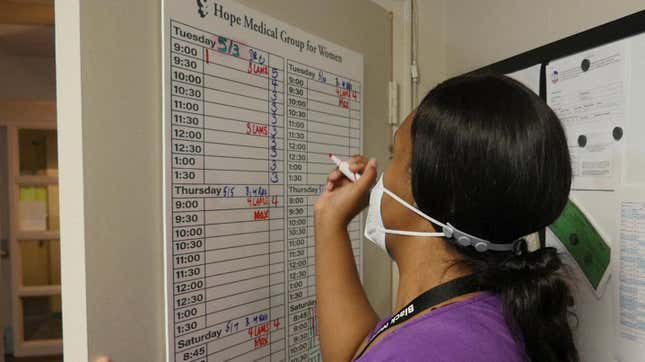How Louisiana Doctors Are Quietly Helping Pregnant Patients (and Themselves) Avoid Jail Time
“We can’t tell the patient to be dishonest, but what we can say is…’What you mean is, you’re already having a miscarriage, right?’”
AbortionPolitics

Jezebel broke the story last week that Louisiana has reported zero legal abortions since August 1, after the state’s near-total ban went into effect.
Of course, that doesn’t mean thousands of pregnant people in the state just stopped needing or having abortions (or any kind of medical treatment that could be construed as an abortion)–doctors and nurses are just having to be a lot more careful in what they say and write down.
Health care providers in Louisiana are using every tool in their arsenal in an attempt to protect their patients, and themselves, from criminal charges. They’re choosing their words carefully, avoiding putting abortion advice in writing, and charting pregnancy-related care meticulously. The Pelican State’s new abortion ban is one of the strictest in the country—with no exceptions for rape or incest—and providers are trying to give their patients the best care possible, while remaining, technically, within the bounds of the law.
Jezebel spoke with multiple doctors and nurses from Louisiana for this story, all of whom asked that neither they nor their hospitals be named, for fear of putting their jobs in jeopardy. One labor and delivery nurse said that since Dobbs, she and fellow like-minded nurses are trying to guide patients toward using appropriate language that wouldn’t criminalize them. “If someone comes in bleeding, you really can’t tell the difference between a self-managed abortion or a spontaneous one,” the nurse told me. “We can’t tell the patient to be dishonest, but what we can say is, something like, ‘What’s wrong with you? What you mean is, you’re already having a miscarriage, right?”
She continued, “We wouldn’t say, ‘Don’t tell anyone,’ but whether or not someone gets into trouble could depend on what facility they go to, or what nurse they end up getting in triage.”
More than one doctor I spoke to said they’ve changed how they do their “charting,” which is how they record a patient’s clinical data and medical history. An emergency room physician said that since abortion was banned in August, she no longer uses the medical terms “spontaneous abortion,” “missed abortion,” or “inevitable abortion,” even though none of those terms clinically refer to elective abortions.
“Now, I don’t put abortion in my chart at all,” she said, “I chart ‘missed miscarriage’ or ‘inevitable miscarriage’ instead.”
-

-

-

-

-

-

-

-

-

-

-

-

-

-

-

-

-

-

-

-

-

-

-

-

-

-

-

-

-

-

-

-

-

-

-

-

-

-

-

-








































